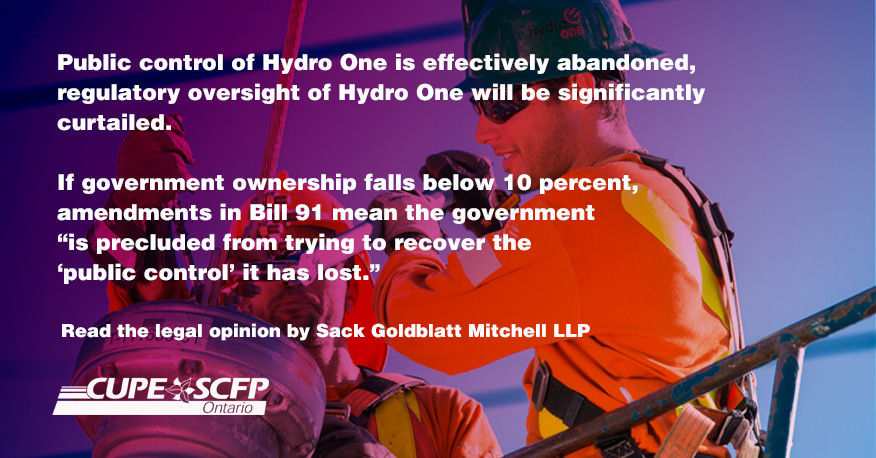TORONTO, ON – If the Liberal government passes its budget omnibus bill, Hydro One will no longer be public and we won’t even be able to learn details of its sale, according to two prominent legal experts. In fact, the sale won’t even produce promised revenue for infrastructure.
“In short, Bill 91 doesn’t do what we’ve been told. It ends public accountability and regulation of Hydro One and even exempts the company from Freedom of Information requests retroactively, so we’ll never know the details of the sale,” said Fred Hahn, president of the Canadian Union of Public Employees (CUPE) Ontario, at a Queen’s Park press conference today.
“Public control of Hydro One is effectively abandoned,” says the legal opinion by Darrell Brown of Sack Goldblatt Mitchell, LLP, released by CUPE Ontario. “Regulatory oversight of Hydro One will be significantly curtailed.”
More than that, the bill makes clear there is no guarantee the government’s ownership share will remain at the 40 percent lever promised by the Wynne government. In fact, it anticipates government ownership falling below 10 percent.
“It does not state explicitly that the share percentage should be maintained at 40 percent…In fact, the amendment explicitly recognizes the possibility that the government interest can be diluted,” the report says. If government ownership falls below 10 percent, amendments in Bill 91 mean the government “is precluded from trying to recover the ‘public control’ it has lost.”
Even the Liberal government’s key claim that the sale will generate a few billion dollars in revenue to spend on infrastructure is dubious.
The Electricity Act had required proceeds from any sale of Hydro One to be paid to the Ontario Hydro Financial Corporation to pay down the company’s debt. Bill 91 instead diverts proceeds to the Consolidated Revenue Fund, but if the government were to spend the money on infrastructure, they would have to pay or forgive an equivalent amount of debt. In other words, borrowing or transferring debt to the province.
The budget omnibus bill also ends Hydro One’s requirement to disclose salary information, removes the company from the government’s executive compensation cap and allows the company to begin paying professional lobbyists.
“If this plan succeeds, we’ll lose a vital public asset that’s the backbone of our economy – something our parents and grandparents build and that we own together. Selling Hydro One makes no economic sense, clearly no moral sense, and we will use every option available to stop the sale,” said Hahn.
-30-
For more information, please contact:
Craig Saunders, CUPE Communications, 416-576-7316

